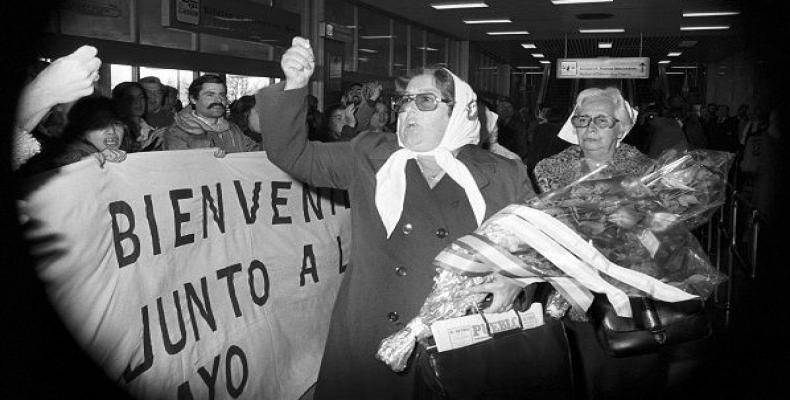Buenos Aires, May 17 (RHC)-- The standoff between human rights organizations in Argentina and President Mauricio Macri's government continues to escalate. Now, the leader of the Argentinean human rights organization Mothers of Plaza de Mayo, Hebe de Bonafini, has been indicted for alleged fraud in a project to build social housing. She responded by speaking truth to power, accusing the South American country's justice system of not serving the people.
Argentinean Judge Marcelo Martinez de Giorgi called for the prosecution of Bonafini and Sergio Schocklender, a trusted coworker, as part of a case that accuses the Mothers of Plaza de Mayo of siphoning off public funds from a social housing program known as “Shared Dreams” between 2005 and 2011.
Prosecutors allege the accused misappropriated up to $13 million in funds intended for building medical centers, schools and houses. Bonafini dismissed the latest accusations, inviting authorities to review her assets, saying that she has always lived in the same house and doesn't even own a bicycle.
"I have a very calm conscience, very calm, they can check what they want," Bonafini said in a video, sarcastically "thanking" the President Mauricio Macri for making her face prosecution.
The iconic human rights leader said the Mothers of the Plaza de Mayo have always faced persecution, including being jailed for up to 15 days at a time for their activism, while others were robbed in their homes. "The Mothers decided to risk their lives for freedom in the same way that our children risked it," she said, referring to the young people disappeared and murdered under the dictatorship for resisting the military regime.
Bonafini went on to criticize the use of the judicial power under Macri's conservative government, stressing that it constitutes "power" and not "justice" and vowing to continue to organize for the well-being of Argentinean people in the streets.
"We are willing to continue doing what we do, we are clear that this is the price we have to pay for saying what we say and doing what we do," Bonafini said. "We will continue denouncing those in this government who are the most sadistic, thieves and the worst we could ever imagine. We are going to continue defending those who have least."
"I am honored to be prosecuted by this power and by this government. Thank you, Macri, for giving me this honor of being processed," she said sarcastically. She added: "I fight for freedom, life, children have a price and this is it: that the judicial power prosecutes me."
Judge Martinez de Giorgi issued a detention order against Bonafini last August after she failed to appear in court to testify in the same case. In a letter to the judge, Bonafini wrote that she and others have already answered multiple calls to testify. She added that the organization has made a “huge effort” to voluntarily provide “60 boxes of evidence, together with 40 back-ups, and other elements” for the case, but accused court authorities of not even reading what was provided.
The arrest warrant was later canceled after police failed to detain her due to a human chain of supporters who blocked off the area in were she was residing. Last year's detention order came months after a federal attorney had accused Bonafini of “inciting mob violence” when she called for mobilizations against the then newly-elected conservative President Macri and called him “the enemy.”
Bonafini is the head of Madres de Plaza de Mayo, an organization that has searched for 40 years for disappeared children from Argentina's military dictatorship era. The women behind the organization have met every Thursday at the Plaza square in Buenos Aires in front of the Casa Rosada presidential palace since 1977.
The women wear a signature white handkerchief in a traditional protest to demand justice for more than 30,000 people who were disappeared by the military regime in the U.S.-backed Dirty War.
Macri has criticized Bonafini, calling her "crazy" and alleging there were only 6,000 victims under the military regime in the 1970s and 1980s. But Bonafini has remained adament in her resistance and struggle for justice.
"Fighting for freedom, for life, for children has a price and the price is this: that the judicial power prosecutes me," she said in response to the judge's latest order.
Two of Bonafini's children and her daughter-in-law were disappeared during the 1976-1983 dictatorship. She has been widely recognized for her activism, including as a recipient of UNESCO’s Prize for Peace Education in 1999 and Ecuador’s Nation Order of Merit in 2006, among others.
Argentina Moves to Prosecute 88-Year-Old Human Rights Activist


